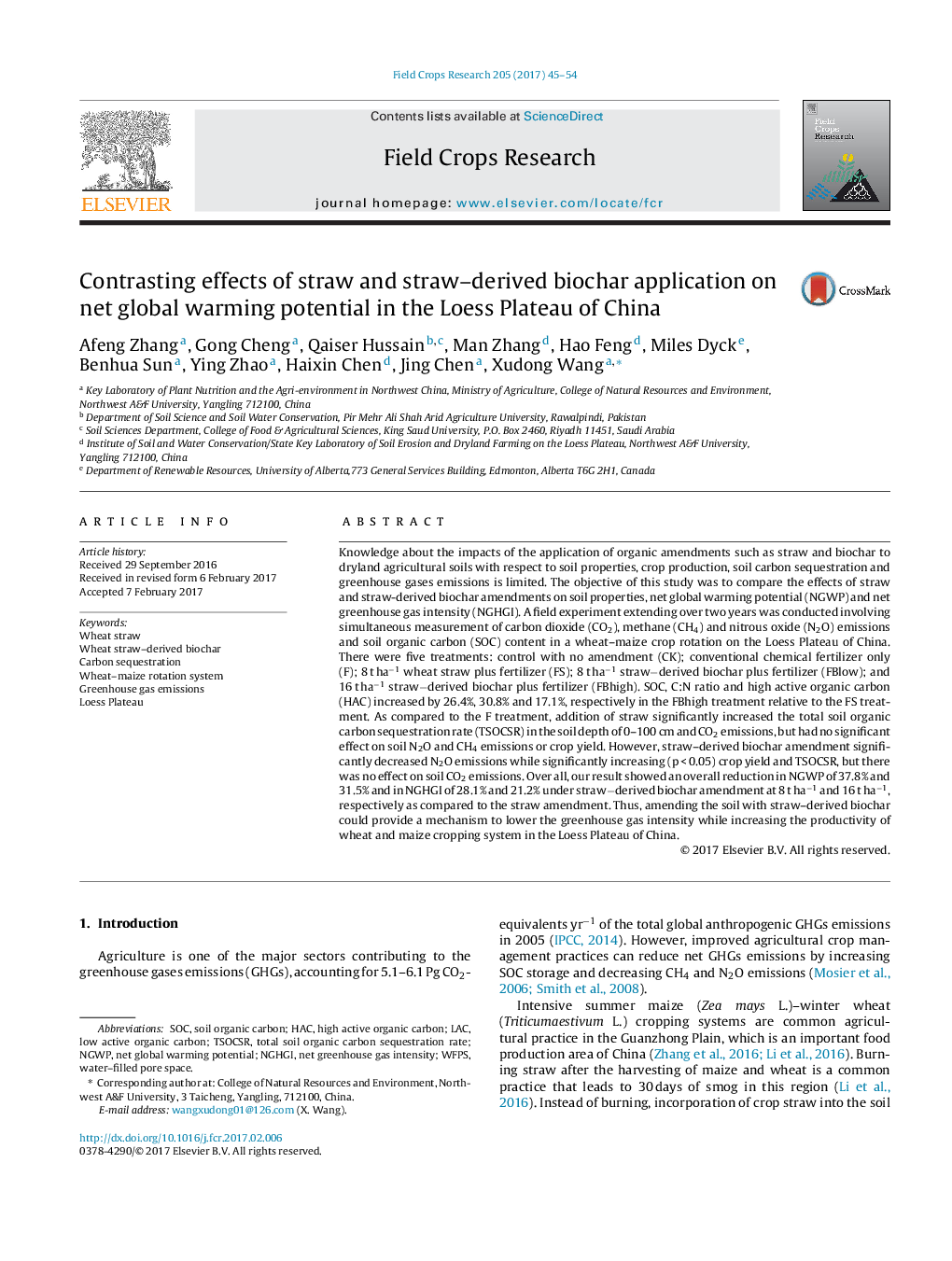| کد مقاله | کد نشریه | سال انتشار | مقاله انگلیسی | نسخه تمام متن |
|---|---|---|---|---|
| 5761591 | 1624658 | 2017 | 10 صفحه PDF | دانلود رایگان |
عنوان انگلیسی مقاله ISI
Contrasting effects of straw and straw-derived biochar application on net global warming potential in the Loess Plateau of China
ترجمه فارسی عنوان
اثرات متقابل اعمال زیست چار کاه و کاه بر پتانسیل گرم شدن کره زمین در ورقه لس در چین
دانلود مقاله + سفارش ترجمه
دانلود مقاله ISI انگلیسی
رایگان برای ایرانیان
کلمات کلیدی
موضوعات مرتبط
علوم زیستی و بیوفناوری
علوم کشاورزی و بیولوژیک
علوم زراعت و اصلاح نباتات
چکیده انگلیسی
Knowledge about the impacts of the application of organic amendments such as straw and biochar to dryland agricultural soils with respect to soil properties, crop production, soil carbon sequestration and greenhouse gases emissions is limited. The objective of this study was to compare the effects of straw and straw-derived biochar amendments on soil properties, net global warming potential (NGWP) and net greenhouse gas intensity (NGHGI). A field experiment extending over two years was conducted involving simultaneous measurement of carbon dioxide (CO2), methane (CH4) and nitrous oxide (N2O) emissions and soil organic carbon (SOC) content in a wheat-maize crop rotation on the Loess Plateau of China. There were five treatments: control with no amendment (CK); conventional chemical fertilizer only (F); 8 t haâ1 wheat straw plus fertilizer (FS); 8 t haâ1 strawâderived biochar plus fertilizer (FBlow); and 16 t haâ1 strawâderived biochar plus fertilizer (FBhigh). SOC, C:N ratio and high active organic carbon (HAC) increased by 26.4%, 30.8% and 17.1%, respectively in the FBhigh treatment relative to the FS treatment. As compared to the F treatment, addition of straw significantly increased the total soil organic carbon sequestration rate (TSOCSR) in the soil depth of 0-100 cm and CO2 emissions, but had no significant effect on soil N2O and CH4 emissions or crop yield. However, straw-derived biochar amendment significantly decreased N2O emissions while significantly increasing (p < 0.05) crop yield and TSOCSR, but there was no effect on soil CO2 emissions. Over all, our result showed an overall reduction in NGWP of 37.8% and 31.5% and in NGHGI of 28.1% and 21.2% under strawâderived biochar amendment at 8 t haâ1 and 16 t haâ1, respectively as compared to the straw amendment. Thus, amending the soil with straw-derived biochar could provide a mechanism to lower the greenhouse gas intensity while increasing the productivity of wheat and maize cropping system in the Loess Plateau of China.
ناشر
Database: Elsevier - ScienceDirect (ساینس دایرکت)
Journal: Field Crops Research - Volume 205, April 2017, Pages 45-54
Journal: Field Crops Research - Volume 205, April 2017, Pages 45-54
نویسندگان
Afeng Zhang, Gong Cheng, Qaiser Hussain, Man Zhang, Hao Feng, Miles Dyck, Benhua Sun, Ying Zhao, Haixin Chen, Jing Chen, Xudong Wang,
